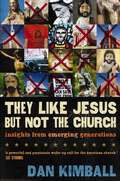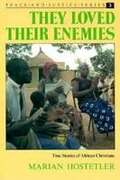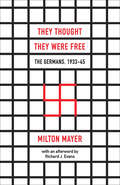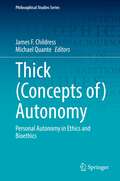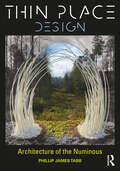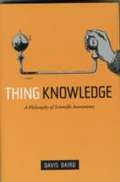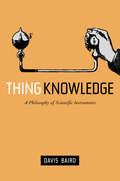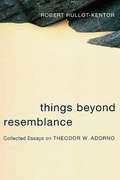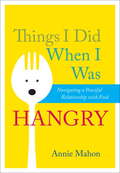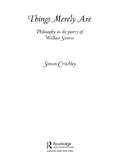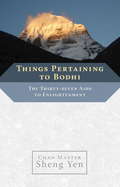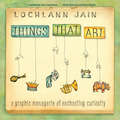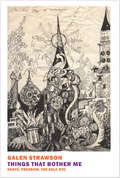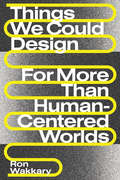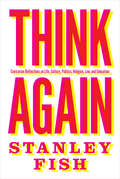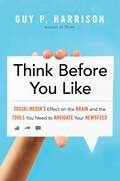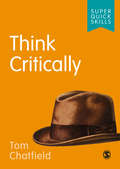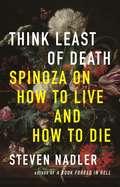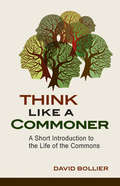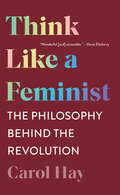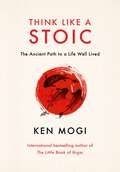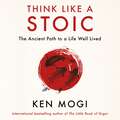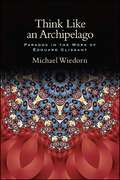- Table View
- List View
They Like Jesus but Not the Church: Insights from Emerging Generations
by Dan KimballAn overview of the six most common objections emerging generations have with church and Christianity along with the biblical answers to these objections and examples of how churches are facing this challenge.
They Loved Their Enemies: True Stories of African Christians
by Marian HostetlerMarian Hostetler tells the stories of many kinds of people -- young and old, male and female, leaders and ordinary folk. There are stories of people from 1,700 years ago and those from recent years. The stories come from across the continent of Africa, from Algeria to South Africa, from Sierra Leone to Kenya. Volume 3.
They Thought They Were Free: The Germans, 1933–45
by Richard J. Evans Milton Mayer“When this book was first published it received some attention from the critics but none at all from the public. Nazism was finished in the bunker in Berlin and its death warrant signed on the bench at Nuremberg.” That’s Milton Mayer, writing in a foreword to the 1966 edition of They Thought They Were Free. He’s right about the critics: the book was a finalist for the National Book Award in 1956. General readers may have been slower to take notice, but over time they did—what we’ve seen over decades is that any time people, across the political spectrum, start to feel that freedom is threatened, the book experiences a ripple of word-of-mouth interest. And that interest has never been more prominent or potent than what we’ve seen in the past year. Mayer, an American journalist of German descent, traveled to Germany in 1935 in attempt to secure an interview with Hitler. He failed, but what he saw in Berlin chilled him. He quickly determined that Hitler wasn’t the person he needed to talk to after all. Nazism, he realized, truly was a mass movement; he needed to talk with the average German. He found ten, and his discussions with them of Nazism, the rise of the Reich, and mass complicity with evil became the backbone of this book, an indictment of the ordinary German that is all the more powerful for its refusal to let the rest of us pretend that our moment, our society, our country are fundamentally immune. A new foreword to this edition by eminent historian of the Reich Richard J. Evans puts the book in historical and contemporary context. We live in an age of fervid politics and hyperbolic rhetoric. They Thought They Were Free cuts through that, revealing instead the slow, quiet accretions of change, complicity, and abdication of moral authority that quietly mark the rise of evil.
Thick: Personal Autonomy in Ethics and Bioethics (Philosophical Studies Series #146)
by James F. Childress Michael QuanteThis book explores, in rich and rigorous ways, the possibilities and limitations of “thick” (concepts of) autonomy in light of contemporary debates in philosophy, ethics, and bioethics. Many standard ethical theories and practices, particularly in domains such as biomedical ethics, incorporate minimal, formal, procedural concepts of personal autonomy and autonomous decisions and actions. Over the last three decades, concerns about the problems and limitations of these “thin” concepts have led to the formulation of “thick” concepts that highlight the mental, corporeal, biographical and social conditions of what it means to be a human person and that enrich concepts of autonomy, with direct implications for the ethical requirement to respect autonomy. The chapters in this book offer a wide range of perspectives on both the elements of and the relations (both positive and negative) between “thin” and “thick” concepts of autonomy as well as their relative roles and importance in ethics and bioethics. This book offers valuable and illuminating examinations of autonomy and respect for autonomy, relevant for audiences in philosophy, ethics, and bioethics.
Thin Place Design: Architecture of the Numinous
by Phillip James TabbWhat makes the places we inhabit extraordinary? Why are some urban spaces more vital and restorative? Wonderful landscapes, inspiring works of architecture and urban design, and the numinous experiences that accompany them have been an integral dimension of our culture. Up-lifting spaces, dramatic use of natural light, harmonic proportional geometry, magical landscapes, historic sites and vital city centers create special, even sacred moments in architecture and planning. This quality of experience is often seen as an aesthetic purpose intended to inspire, ennoble, ensoul and spiritually renew. Architecture and urban spaces, functioning in this way, are considered to be thin places.
Thing Knowledge: A Philosophy of Scientific Instruments
by Davis BairdDrawing on a wide range of case studies, Thing Knowledge argues that scientific instuments are more than mere tools for examining phenonmena, but rather bearers of knowledge.
Thing Knowledge: A Philosophy of Scientific Instruments
by Davis BairdWestern philosophers have traditionally concentrated on theory as the means for expressing knowledge about a variety of phenomena. This absorbing book challenges this fundamental notion by showing how objects themselves, specifically scientific instruments, can express knowledge. As he considers numerous intriguing examples, Davis Baird gives us the tools to "read" the material products of science and technology and to understand their place in culture. Making a provocative and original challenge to our conception of knowledge itself, Thing Knowledge demands that we take a new look at theories of science and technology, knowledge, progress, and change. Baird considers a wide range of instruments, including Faraday's first electric motor, eighteenth-century mechanical models of the solar system, the cyclotron, various instruments developed by analytical chemists between 1930 and 1960, spectrometers, and more.
Things Beyond Resemblance: Collected Essays on Theodor W. Adorno (Columbia Themes in Philosophy, Social Criticism, and the Arts)
by Robert Hullot-KentorTheodor W. Adorno was a major twentieth-century philosopher and social critic whose writings on oppositional culture in art, music, and literature increasingly stand at the center of contemporary intellectual debate. In this excellent collection, Robert Hullot-Kentor, widely regarded as the most distinguished American translator and commentator on Adorno, gathers together sixteen essays he has written about the philosopher over the past twenty years. The opening essay, "Origin Is the Goal," pursues Adorno's thesis of the dialectic of enlightenment to better understand the urgent social and political situation of the United States. "Back to Adorno" examines Adorno's idea that sacrifice is the primordial form of human domination; "Second Salvage" reconstructs Adorno's unfinished study of the transformation of music in radio transmission; and "What Is Mechanical Reproduction" revisits Adorno's criticism of Walter Benjamin. Further essays cover a broad range of topics: Adorno's affinities with Wallace Stevens and Nabokov, his complex relationship with Kierkegaard and psychoanalysis, and his critical study of popular music.Many of these essays have been revised, with new material added that emphasizes the relevance of Adorno's thought to the United States today. Things Beyond Resemblance is a timely and richly analytical collection crucial to the study of critical theory, aesthetics, continental philosophy, and Adorno.
Things I Did When I Was Hangry
by Annie MahonAfter years of struggling with eating disorders and anxiety around food and eating, Annie Mahon figured that having a path, any path, would be helpful. When she read The Miracle of Mindfulness by Thich Nhat Hanh, she changed her relationship with food and transformed nearly every aspect of her life.In Things I Did When I Was Hangry, Annie shares her path to mindful cooking and eating. The book fits together more like a wheel than sequential steps. Readers are invited to jump in and take what works for them.Each section tells short, humorous, and poignant stories about Annie's own journey toward more conscious cooking and eating. She shares mindfulness practices that support more ease around food, and simple, delicious vegetarian recipes compliment each section, demonstrating mindful alternatives for every meal.Mindful eating has been shown to improve body acceptance, diminish negative self-talk, and support weight loss. Annie Mahon's stories, recipes, and suggestions are scaffolding anyone can use to develop an easier and more joyful relationship with food and eating.
Things Merely Are: Philosophy in the Poetry of Wallace Stevens
by Simon CritchleyThis book is an invitation to read poetry. Simon Critchley argues that poetry enlarges life with a range of observation, power of expression and attention to language that eclipses any other medium. In a rich engagement with the poetry of Wallace Stevens, Critchley reveals that poetry also contains deep and important philosophical insight. Above all, he agues for a 'poetic epistemology' that enables us to think afresh the philosophical problem of the relation between mind and world, and ultimately to cast the problem away.Drawing astutely on Kant, the German and English Romantics and Heidegger, Critchley argues that through its descriptions of particular things and their stubborn plainness - whether water, guitars, trees, or cats - poetry evokes the 'mereness' of things. It is this experience, he shows, that provokes the mood of calm and releases the imaginative insight we need to press back against the pressure of reality. Critchley also argues that this calm defines the cinematic eye of Terrence Malick, whose work is discussed at the end of the book.
Things Pertaining to Bodhi: The Thirty-seven Aids to Enlightenment
by Sheng YenThe Thirty-seven Aids to Enlightenment are a set of fundamental teachings of Buddhism in the form of a list. The list's seeming simplicity belies the fact that it is actually a kind of road map to enlightenment for anyone who follows it with diligence and sincerity. The Thirty-seven Aids comprise seven groups of practices conducive to awakening. Each of the seven groups is itself a list of enlightenment factors, which add up to a total of thirty-seven: (1) The Four Foundations of Mindfulness, (2) The Four Proper Exertions, (3) The Four Steps to Magical Powers, (4) The Five Roots, (5) The Five Powers, (6) The Seven Factors of Enlightenment, and (7) The Noble Eightfold Path. Master Sheng Yen's down-to-earth teachings take the reader on a progression through each of the practices, illustrating how they relate to the reader's own path toward enlightenment.
Things That Art: A Graphic Menagerie of Enchanting Curiosity (ethnoGRAPHIC)
by Lochlann JainLochlann Jain’s debut non-fiction graphic novel, Things That Art, playfully interrogates the order of things. Toying with the relationship between words and images, Jain’s whimsical compositions may seem straightforward. Upon closer inspection, however, the drawings reveal profound and startling paradoxes at the heart of how we make sense of the world. Commentaries by architect and theorist Maria McVarish, poet and naturalist Elizabeth Bradfield, musician and English Professor Drew Daniel, and the author offer further insight into the drawings in this collection. A captivating look at the fundamental absurdities of everyday communication, Things That Art jolts us toward new forms of collation and collaboration.<P><P> <i>Advisory: Bookshare has learned that this book offers only partial accessibility. We have kept it in the collection because it is useful for some of our members. Benetech is actively working on projects to improve accessibility issues such as these.</i>
Things That Bother Me: Death, Freedom, the Self, Etc.
by Galen StrawsonAn original collection of lauded philosopher Galen Strawson's writings on the self and consciousness, naturalism and pan-psychism.Galen Strawson might be described as the Montaigne of modern philosophers, endlessly curious, enormously erudite, unafraid of strange, difficult, and provocative propositions, and able to describe them clearly—in other words, he is a true essayist. Strawson also shares with Montaigne a particular fascination with the elastic and elusive nature of the self and of consciousness. Of the essays collected here, “A Fallacy of Our Age” (an inspiration for Vendela Vida’s novel Let the Northern Lights Erase Your Name) takes issue with the commencement-address cliché that life is a story. Strawson questions whether it is desirable or even meaningful to think about life that way. “The Sense of the Self” offers an alternative account, in part personal, of how a distinct sense of self is not at all incompatible with a sense of the self as discontinuous, leading Strawson to a position that he sees as in some ways Buddhist. “Real Naturalism” argues that a fully naturalist account of consciousness supports a belief in the immanence of consciousness in nature as a whole (also known as panpsychism), while in the final essay Strawson offers a vivid account of coming of age in the 1960s. Drawing on literature and life as much as on philosophy, this is a book that prompts both argument and wonder.
Things We Could Design: For More Than Human-Centered Worlds (Design Thinking, Design Theory)
by Ron WakkaryHow posthumanist design enables a world in which humans share center stage with nonhumans, with whom we are entangled.Over the past forty years, designers have privileged human values such that human-centered design is seen as progressive. Yet because all that is not human has been depleted, made extinct, or put to human use, today's design contributes to the existential threat of climate change and the ongoing extinctions of other species. In Things We Could Design, Ron Wakkary argues that human-centered design is not the answer to our problems but is itself part of the problem. Drawing on philosophy, design theory, and numerous design works, he shows the way to a relational and expansive design based on humility and cohabitation. Wakkary says that design can no longer ignore its exploitation of nonhuman species and the materials we mine for and reduce to human use. Posthumanism, he argues, enables a rethinking of design that displaces the human at the center of thought and action. Weaving together posthumanist philosophies with design, he describes what he calls things--nonhumans made by designers--and calls for a commitment to design with more than human participation. Wakkary also focuses on design as "nomadic practices"--a multiplicity of intentionalities and situated knowledges that shows design to be expansive and pluralistic. He calls his overall approach "designing-with": the practice of design in a world in which humans share center stage with nonhumans, and in which we are bound together materially, ethically, and existentially.
Think Again
by Stanley FishFrom 1995 to 2013, Stanley Fish's provocative New York Times columns consistently generated passionate discussion and debate. In Think Again, he has assembled almost one hundred of his best columns into a thematically arranged collection with a substantial new introduction that explains his intention in writing these pieces and offers an analysis of why they provoked so much reaction.Some readers reported being frustrated when they couldn't figure out where Fish, one of America's most influential thinkers, stood on the controversies he addressed in the essays--from atheism and affirmative action to plagiarism and postmodernism. But, as Fish says, that is the point. Opinions are cheap; you can get them anywhere. Instead of offering just another set of them, Fish analyzes and dissects the arguments put forth by different sides--in debates over free speech, identity politics, the gun lobby, and other hot-button topics--in order to explain how their arguments work or don't work. In short, these are essays that teach you not what to think but how to think more clearly.Brief and accessible yet challenging, these essays provide all the hard-edged intellectual, cultural, and political analysis one expects from Fish. At the same time, the collection includes a number of revealing and even poignant autobiographical essays in which, as Fish says, "readers will learn about my anxieties, my aspirations, my eccentricities, my foibles, my father, and my obsessions--Frank Sinatra, Ted Williams, basketball, and Jews." Reflecting the wide-ranging interests of one of today's leading critics, this is Fish's broadest and most engaging book to date.
Think Before You Like: Social Media's Effect on the Brain and the Tools You Need to Navigate Your Newsfeed
by Guy P. HarrisonAt a time when the news cycle turns on a tweet, journalism gets confused with opinion, and facts are treated as negotiable information, applying critical thinking skills to your social media consumption is more important than ever. Guy P. Harrison, an upbeat advocate of scientific literacy and positive skepticism, demonstrates how critical thinking can enhance the benefits of social media while giving users the skills to guard against its dangers. Social media has more than two billion users and continues to grow. Its widespread appeal as a means of staying in touch with friends and keeping up with daily news masks some serious pitfalls-- misinformation, pseudoscience, fraud, propaganda, and irrational beliefs, for example, presented in an attractive, easy-to-share form. This book will teach you how to resist the psychological and behavioral manipulation of social media and avoid the mistakes that millions have already made and now regret. Harrison presents scientific studies that show why your subconscious mind loves social media and how that can work against your ability to critically evaluate information. Among other things, social media reinforces your biases, clouds your judgment with images that leave a false impression, and fills your brain with anecdotes that become cheap substitutes for objective data. The very nature of the technology keeps you in a bubble; by tracking your preferences it sends only filtered newsfeeds, so that you rarely see anything that might challenge your set notions. Harrison explores the implications of having digital "friends" and the effects on mood, self-esteem, and the cultivation of friendship in the real world. He discusses how social media affects attention spans and the ability to consider issues in depth. And he suggests ways to protect yourself against privacy invasion, cyberstalking, biased misinformation, catfishing, trolls, misuse of photos, and the confusion over fake news versus credible journalism.
Think Critically (Super Quick Skills)
by Tom ChatfieldCritical thinking is an essential 21st century skill. Think Critically gives you simple, direct guidance on how to effectively assess and critique the world around you. Understand the nature of assumptions and claims Grasp the notion of valid and invalid arguments and evidence Gain practical skills and confidence in reading, writing and doing research. Super Quick Skills provide the essential building blocks you need to succeed at university - fast. Packed with practical, positive advice on core academic and life skills, you’ll discover focused tips and strategies to use straight away. Whether it’s writing great essays, understanding referencing or managing your wellbeing, find out how to build good habits and progress your skills throughout your studies. Learn core skills quickly Apply right away and see results Succeed in your studies and life. Super Quick Skills give you the foundations you need to confidently navigate the ups and downs of university life.
Think Critically (Super Quick Skills)
by Tom ChatfieldCritical thinking is an essential 21st century skill. Think Critically gives you simple, direct guidance on how to effectively assess and critique the world around you. Understand the nature of assumptions and claims Grasp the notion of valid and invalid arguments and evidence Gain practical skills and confidence in reading, writing and doing research. Super Quick Skills provide the essential building blocks you need to succeed at university - fast. Packed with practical, positive advice on core academic and life skills, you’ll discover focused tips and strategies to use straight away. Whether it’s writing great essays, understanding referencing or managing your wellbeing, find out how to build good habits and progress your skills throughout your studies. Learn core skills quickly Apply right away and see results Succeed in your studies and life. Super Quick Skills give you the foundations you need to confidently navigate the ups and downs of university life.
Think Least of Death: Spinoza on How to Live and How to Die
by Steven NadlerFrom Pulitzer Prize-finalist Steven Nadler, an engaging guide to what Spinoza can teach us about life’s big questionsIn 1656, after being excommunicated from Amsterdam’s Portuguese-Jewish community for “abominable heresies” and “monstrous deeds,” the young Baruch Spinoza abandoned his family’s import business to dedicate his life to philosophy. He quickly became notorious across Europe for his views on God, the Bible, and miracles, as well as for his uncompromising defense of free thought. Yet the radicalism of Spinoza’s views has long obscured that his primary reason for turning to philosophy was to answer one of humanity’s most urgent questions: How can we lead a good life and enjoy happiness in a world without a providential God? In Think Least of Death, Pulitzer Prize–finalist Steven Nadler connects Spinoza’s ideas with his life and times to offer a compelling account of how the philosopher can provide a guide to living one’s best life.In the Ethics, Spinoza presents his vision of the ideal human being, the “free person” who, motivated by reason, lives a life of joy devoted to what is most important—improving oneself and others. Untroubled by passions such as hate, greed, and envy, free people treat others with benevolence, justice, and charity. Focusing on the rewards of goodness, they enjoy the pleasures of this world, but in moderation. “The free person thinks least of all of death,” Spinoza writes, “and his wisdom is a meditation not on death but on life."An unmatched introduction to Spinoza’s moral philosophy, Think Least of Death shows how his ideas still provide valuable insights about how to live today.
Think Like a Commoner
by David BollierThe biggest "tragedy of the commons" is the misconception that commons are failures--relics from another era rendered unnecessary by the market and state. Think Like a Commoner dispels such prejudices by explaining the rich history and promising future of the commons--an ageless paradigm of cooperation and fairness that is re-making our world.With graceful prose and dozens of fascinating stories, David Bollier describes the quiet revolution that is pioneering practical forms of self-governance and production controlled by people themselves. Think Like a Commoner explains how the commons: Is an exploding field of DIY innovation ranging from Wikipedia and seed-sharing to community forests, collaborative consumption, and beyond Challenges the standard narrative of market economics by explaining how cooperation generates significant value and human fulfillment Provides a framework of law and social action that can help us move beyond the pathologies of neoliberal capitalismWe have a choice: ignore the commons and suffer the ongoing private plunder of our common wealth, or Think Like a Commoner and learn how to rebuild our society and reclaim our shared inheritance. This accessible, comprehensive introduction to the commons will surprise and enlighten you, and provoke you to action.David Bollier is an author, activist, blogger, and independent scholar. He is the author of six books on different aspects of the commons, including Green Governance, The Wealth of the Commons, and Viral Spiral, and is a frequent speaker at conferences, colleges and universities, and policy workshops.
Think Like a Feminist: The Philosophy Behind The Revolution
by Carol HayAn audacious and accessible guide to feminist philosophy—its origins, its key ideas, and its latest directions. Think Like a Feminist is an irreverent yet rigorous primer that unpacks over two hundred years of feminist thought. In a time when the word feminism triggers all sorts of responses, many of them conflicting and misinformed, Professor Carol Hay provides this balanced, clarifying, and inspiring examination of what it truly means to be a feminist today. She takes the reader from conceptual questions of sex, gender, intersectionality, and oppression to the practicalities of talking to children, navigating consent, and fighting for adequate space on public transit, without deviating from her clear, accessible, conversational tone. Think Like a Feminist is equally a feminist starter kit and an advanced refresher course, connecting longstanding controversies to today’s headlines. Think Like a Feminist takes on many of the essential questions that feminism has risen up to answer: Is it nature or nurture that’s responsible for our gender roles and identities? How is sexism connected to racism, classism, homophobia, transphobia, and other forms of oppression? Who counts as a woman, and who gets to decide? Why have men gotten away with rape and other forms of sexual violence for so long? What responsibility do women themselves bear for maintaining sexism? What, if anything, can we do to make society respond to women’s needs and desires? Ferocious, insightful, practical, and unapologetically opinionated, Think Like a Feminist is the perfect book for anyone who wants to understand the continuing effects of misogyny in society. By exploring the philosophy underlying the feminist movement, Carol Hay brings today’s feminism into focus, so we can deliberately shape the feminist future.
Think Like a Stoic: The Ancient Path to a Life Well Lived
by Ken MogiIn a world overflowing with abundance and information, the calm and clarity of stoicism has never been more necessary. In this new book, bestselling author Ken Mogi explores the ancient Greek philosophy as well as its resonance with other cultures around the world, not least his own Japanese perspective. The result is a new version of stoicism that is practical, global, future-proof and, above all, optimistic.With his expertise as a neuroscientist, Mogi uncovers the cognitive foundations of the resilience that is so central to stoicism. Rooted in science, he finds in stoicism robust coping strategies for the challenges of modern life, and ways to balance self-discipline with enjoying life's pleasures.But stoicism is also a mindset that uniquely equips us to handle the future, from global challenges such as the climate emergency to the rise and rise of AI. Thinking like a stoic, he argues, can offer us not just a path for personal growth and wisdom, but the key to the future of humanity.
Think Like a Stoic: The Ancient Path to a Life Well Lived
by Ken MogiIn a world overflowing with abundance and information, the calm and clarity of stoicism has never been more necessary. In this new book, bestselling author Ken Mogi explores the ancient Greek philosophy as well as its resonance with other cultures around the world, not least his own Japanese perspective. The result is a new version of stoicism that is practical, global, future-proof and, above all, optimistic.With his expertise as a neuroscientist, Mogi uncovers the cognitive foundations of the resilience that is so central to stoicism. Rooted in science, he finds in stoicism robust coping strategies for the challenges of modern life, and ways to balance self-discipline with enjoying life's pleasures.But stoicism is also a mindset that uniquely equips us to handle the future, from global challenges such as the climate emergency to the rise and rise of AI. Thinking like a stoic, he argues, can offer us not just a path for personal growth and wisdom, but the key to the future of humanity.
Think Like a Stoic: The Ancient Path to a Life Well Lived
by Ken MogiIn a world overflowing with abundance and information, the calm and clarity of stoicism has never been more necessary. In this new book, bestselling author Ken Mogi explores the ancient Greek philosophy as well as its resonance with other cultures around the world, not least his own Japanese perspective. The result is a new version of stoicism that is practical, global, future-proof and, above all, optimistic.With his expertise as a neuroscientist, Mogi uncovers the cognitive foundations of the resilience that is so central to stoicism. Rooted in science, he finds in stoicism robust coping strategies for the challenges of modern life, and ways to balance self-discipline with enjoying life's pleasures.But stoicism is also a mindset that uniquely equips us to handle the future, from global challenges such as the climate emergency to the rise and rise of AI. Thinking like a stoic, he argues, can offer us not just a path for personal growth and wisdom, but the key to the future of humanity.
Think Like an Archipelago: Paradox in the Work of Edouard Glissant (SUNY series, Philosophy and Race)
by Michael WiedornWith a career spanning more than fifty years as a writer, scholar, and public intellectual, Édouard Glissant produced an astonishingly wide range of work, including poems, novels, essays, pamphlets, and theater. In Think Like an Archipelago, Michael Wiedorn offers a fresh interpretation of Glissant's work as a cohesive and explicitly philosophical project, paying particular attention to the last two decades of his career, which have received much less attention in the English-speaking world despite their remarkable productivity. Focusing his study on the idea of paradox, Wiedorn argues that it is fundamental to Caribbean culture and thought, and at the heart of Glissant's philosophy.The question of difference has long played a central role in the literary and philosophical traditions of the West, however to think differently, Glissant suggests focusing elsewhere: on the post-plantation societies of the Caribbean, and the Americas more broadly. For Glissant, paradoxical lessons drawn from the natural and cultural realities of the Caribbean can point to new ways of thinking and being in the world: in other words, to the creation of what Glissant calls a "new category of literature," and in turn to the attainment of his utopian political vision. Thinking through such paradoxes, Wiedorn demonstrates, can offer new perspectives on the old questions of totality, alterity, teleology, and the potential of philosophy itself.
